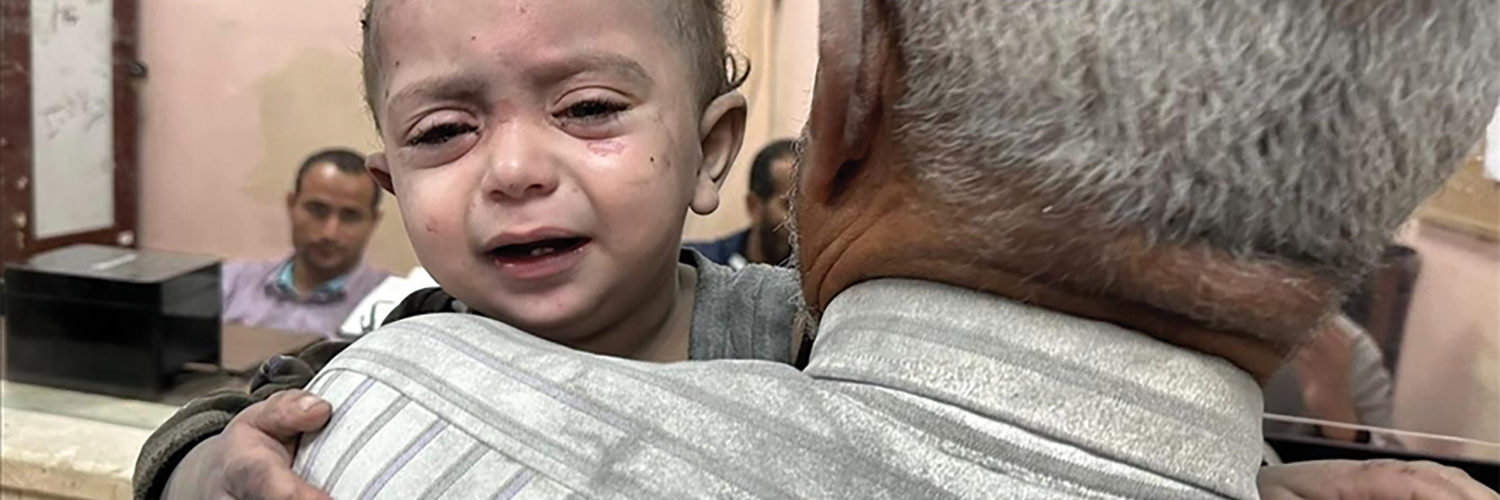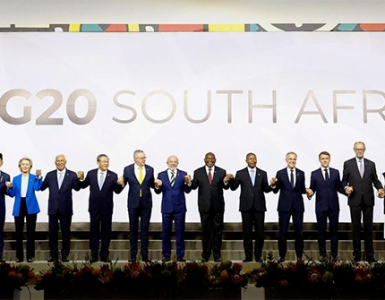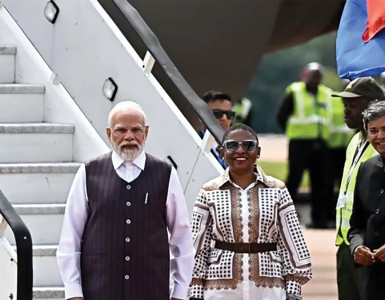EXTREMITIES: “We are running out of words to describe the horror unfolding in Gaza,” the World Health Organization boss told a media briefing yesterday. Following are his full remarks on Gaza, Israel, Sudan conflicts…
By Tedros Ghebreyesus
Since Hamas’s horrific attacks on Israel on the 7th of October, more than 10 thousand people have been killed, including more than 8,500 in Gaza and 1,400 in Israel. In both Israel and Gaza, 70% of those killed are women and children.
More than 21 thousand are injured and more than 1.4 million people in Gaza have been displaced.
The situation on the ground is indescribable. Hospitals crammed with the injured, lying in corridors; morgues overflowing; doctors performing surgery without anaesthesia;
Thousands of people seeking shelter from the bombardment; families crammed into overcrowded schools, desperate for food and water; toilets overflowing and the risk of disease outbreaks spreading; and everywhere, fear, death, destruction, loss.
So far, WHO has verified 237 attacks on health care, including 218 in the occupied Palestinian territory and 19 in Israel. Attacks on health care are a violation of international humanitarian law.
14 out of 36 hospitals in the Gaza strip are non-functional. However, functionality is affected by lack of food and clean water, and the lack of fuel to power generators.
As health needs soar, our ability to meet those needs is plummeting. 23 hospitals have been ordered to evacuate in Gaza city and North Gaza. Forced evacuation in these circumstances would put the lives of hundreds of patients in a life-threatening situation.
Moving a baby on life support would be hazardous in a high-income country. Doing so in Gaza would gravely endanger a child whose life has only just begun, and who knows nothing of this conflict, nor is responsible for it.
Demanding these patients move puts them and the health workers in an impossible situation. And in most cases, they have nowhere to go.
I send my appreciation to health workers in both Gaza and Israel who are dealing with the consequences of this conflict.
The best way to support those health workers and the people they serve is to strengthen the existing health system – by resupplying the hospitals, and ensuring their security.
In the past two weeks, WHO has been able to deliver 54 metric tonnes of humanitarian supplies to Gaza.
But this does not even begin to address the scale of need. Far more is needed than can be delivered with a drip-feed of aid.
Before the 7th of October, an average of 500 trucks a day were crossing into Gaza with essential supplies. Since the 7th of October, only 217 trucks have entered in total.
To sustain the humanitarian response on the scale needed, we need hundreds of trucks to enter Gaza every day. We thank Egypt for opening the Rafah border crossing to allow the evacuation of severely injured patients and foreign nationals.
It is too late to help the dead now. But we can help the living. We can help those who live every moment in fear. We can help injured civilians. We can help the almost 200 women who are expected to deliver babies every day. We can help children and older people. We can help those with life-threatening diseases who need urgent medical care.
WHO will do everything we can to ensure that all people in Gaza have access to life saving health and humanitarian services. In the current situation this is almost impossible.
At the very least, we need a humanitarian pause in the fighting, and ideally an end to the conflict. We need unfettered access and safe passage agreed by both parties to ensure the security of access routes.
Let me be clear: there can be no justification for Hamas’s horrific attacks on Israel. I understand the grief, the anger and the fear of the Israeli people. I also understand the grief, the anger, and the fear of the Palestinian people.
WHO continues to call on Hamas to release the hostages it took, many of whom need urgent medical attention. We continue to call on Israel to restore supplies of electricity, water and fuel. We continue to call on both sides to abide by their obligations under international humanitarian law.
And we call on all who can to de-escalate this conflict, rather than inflame it. While the world’s attention is focused on Gaza and Israel, we are continuing to remind the world that we cannot forget Sudan.
Since the conflict erupted in April, almost 6 million people have been displaced, including 4.6 million within Sudan. Combined with the more than 3 million people who were already displaced before the war, Sudan now has one of the largest numbers of internally displaced persons in the world.
The already-fragile health system is buckling under the load of injuries, outbreaks, malnutrition and untreated cases of diabetes, cancer and cardiovascular, kidney and respiratory disease. In addition to measles, rubella, malaria and dengue, outbreaks of cholera have been declared in three states.
WHO is preparing to support cholera vaccination campaigns. More than 70 percent of health facilities in conflict hotspots are non-functional, and in areas not directly affected by the conflict, health facilities are overwhelmed with patients.
Critical services have been discontinued in many areas, including for maternal and child care, severe acute malnutrition, and treatment of non-communicable diseases.
Meanwhile, the health system itself continues to be attacked. So far, WHO has verified 60 attacks on health care since the start of the conflict, including the occupation of a paediatric centre in Nyala, in South Darfur, last week.
We are pleased that the hospital staff have been released unharmed, but the paediatric centre was looted and has had to suspend its operations.
I thank all health workers in Sudan, most of whom have not been paid in six months, but continue to serve in the most difficult context. While talks between the parties to the conflict have resumed in Saudi Arabia, there is no sign of improvement on the ground.
We call on the parties to implement the commitments they made in May this year The late Kofi Annan said that suffering anywhere concerns people everywhere.The suffering of civilians in the occupied Palestinian territory, Israel and Sudan, and in so many other crises, must concern all of us.
WHO is doing everything it can to alleviate suffering in all of these places.
But in each case, the ultimate solution is one thing we can’t provide: peace.
Comment
PUBLIC PROTECTOR MUST STRIVE TO PUT
SA FIRST
Advocate Kholeka Gcaleka, whose appointment as the new Public Protector was confirmed by President Cyril Ramaphosa this week, should be reminded that apartheid in this country is still very much alive and that there are certain Whites who still believe that Black people have no right to be educated and occupy positions of power.
Gcaleka should take leaf from the insults hurled at her by the DA Member of Parliament, Glynnis Breytenbach in the National Assembly about two weeks ago in which she insinuated that Gcaleka, who was recommended to become the new Public Protector rose to her present position because of her intimate relationship with her former boss. This offending remark, by a former prosecutor for the National Prosecuting Authority of South Africa, has rightly being interpreted as a racist attack on all Black professional women who had reached the peak of their successes.
What compounds the matter is that Breytenbach refused to withdraw the insulting remarks when ordered to do so by National Assembly Speaker, Nosiviwe-Mapisa Nqakula. She was then ordered to leave the House. Leaders of the DA, who profess to be the advocates of democracy and seeking support from Black people to join their fold to help topple the ANC government, remained quiet during the spewing of these insults. They did nothing to admonish their shadow minister of justice.
We appeal to those Whites who share the same views with Breytenbach about Black women, not to open the wounds that Black people had suffered under apartheid laws. Despite the untold sufferings they were subjected to, they were still prepared to forgive their White oppressors when the ANC took over and ushered in a democratic government in 1994. This government also allowed the oppressors to be part and parcel of decision-making processes of this country – a move that was denied the majority of the populace of this country for years.
It is obvious that Breytenbach made the hurting remarks in Parliament where she is immuned from criminal prosecution or action for defamation. We challenge her to make the same remarks outside Parliament.
Black women have a right to dignity and respect. And Black professional women in this country have proven to all and sundry that despite the draconian apartheid laws that were designed to keep them in the kitchen, they studied hard to become Judges, lawyers, cabinet ministers and community leaders, amongst others.
Gcaleka is advised to focus and strive to serve her country to the best of her ability. She must not be distracted by those Whites who are still in the laager and viewed Black people as tools that they can use to achieve their own goals and thereafter dump them. We wish her all the best.






























